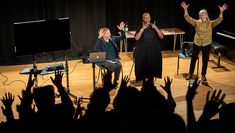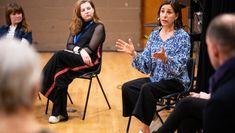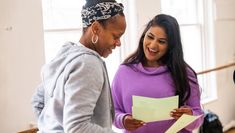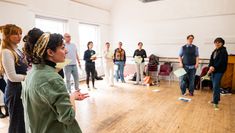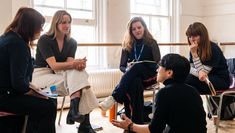About the event
The weekend of the 22nd of April, 2023 saw the International Network for Voice (INV) meet for the first time since its last symposium in 2018, Santiago, Chile. Voice practitioners from a multitude of specialities came to share knowledge and professional development at the Royal Central School of Speech and Drama, London, the base for the INV under the directorship of Jane Boston and Natacha Osorio. The theme for this year’s symposium: Decolonising Studio Voice Practice.
You can download the programme and presenter bios further down on this page.
Events of recent years have foregrounded the experience of Global Majority students within UK drama schools and the pervasive unconscious biases within current actor training pedagogies. The INV Symposium 2023 invited voice practitioners to engage with discussion and learning in this area, hosting twelve events over the course of two days.
The Symposium opened on Friday evening, with two keynote speakers. Central’s Principal, Josette Bushell-Mingo OBE delivered her opening address in Swedish Sign Language, highlighting the missing voice in a room full of voice practitioners. It was a stark and elegant reminder of the work to be undertaken and a poignant invitation for openness to learning as the symposium began. Bushell-Mingo went on to speak with eloquence, passion and clarity on the imperative need for these conversations both over the course of the weekend, and most importantly, beyond.
Keynote speaker Matthew Mills, with contributions from trans and non-binary colleagues via pre-recorded videos, next offered a presentation and reflections on the concepts of ‘belonging’ and ‘othering’ within the positionality of trans and non-binary voice practice and pedagogy. Mills spoke from both personal and professional experience, and with input from colleagues, offered practical suggestions for developing a trans-affirming pedagogy, followed by a Q&A.
Fridays evening concluded with a drinks reception and opportunity for practitioners to meet and share experiences.
Saturday was a full day of nine workshops led by voice specialists across the field making offers and guiding discussions on how to create a more inclusive space and challenging where voice studio practice can go further to decenter and decolonise pedagogies and practices.
In the morning sessions voice and accent coach Anne Whitaker, Lead Voice Tutor at Rose Bruford SouthWest, hosted a workshop entitled Prosodic Presumptions, examining the lack of pedagogical study on prosody in voice and speech work, and the implications for inclusive practice in the voice classroom. The question posed was this; if we do not have a clear framework for the teaching of prosody in the classroom, how can we be sure that we as practitioners are not allowing unconscious biases to exclude and erase the experience of the Global Majority student. Participants were led through exercises to identify holes in the teaching pedagogy around prosody, and Whitaker facilitated discussion about how practitioners might gain a more astute awareness of their own unconscious biases.
Also offered in the morning was Robert Price and Lydia Flock’s workshop on Decentralising power in the relationship between the toucher and the touched, a relational approach to touch-based cueing. Robert Price is currently working at the VoiceCare Center in SOHO and has a strong background in voice tutoring at many drama schools including RADA and LAMDA. Lydia Flock is voice coach, researcher, and vocal masseuse. Their workshop focused on how to create person-centred consent and its application to manual therapy. They lead members through a discussion around what consent and touch-based cueing can look like within a classroom and manual therapy setting. Participants discussed what consent looks like in their own practice whilst sharing thoughts on how this may be moving forward. Participants were then invited to explore Flock and BLAH’s EQUATION model of consent. This workshop left participants with a greater understanding of consent and touch based pedagogies in the 21st century, challenging us all to centre students in our practice.
Morwenna Rowe led a workshop called Conservatoire Teaching Cultures: The Three Bears and Goldilocks the Voice Coach. Or ‘Somebody Already Lives Here’ as the third session offered in the morning. The work looked at colonisation in the classroom through the lens of the individual. Morwenna posed to the room that there is no such thing as normal, and challenged the practitioners in the room on how this can be realised in the drama conservatoire system. She led the voice practitioners in the room through a discussion on how we can position ourselves to support actors’ vocal progression without being a ‘critical visitor’ or ‘Goldilocks’ in the selfhood of the student actor.
The second session of the day was hosted by Catheryn Robson, a Fitzmaurice Voicework practitioner and faculty member at the Royal Central School of Speech and Drama. Robson opened with a discussion on ableism in the voice classroom and current work being undertaken to adapt Fitzmaurice Voicework into a more inclusive pedagogy. Robson proffers the definition of ableism as ‘discrimination in favour of non-disabled people’ (“Everyday AbleismLA UCU collective approach to challenging disability discrimination” (2023).) and identifies some of the ways in which this can be adapted to in the Fitzmaurice Voice teaching. The workshop then took participants into practical work, giving examples of adaptive teaching in practice. This workshop made strong and actionable offers for participants to take into their own practice as we seek to decolonise studio voice practice.
The workshop entitled Decolonising studio voice practice was also offered in the second session of the day. This presentation showcased the ongoing collaboration of Jane Boston, Course Leader of the MA Voice Studies course at the Royal Central School for Speech and Drama as well as director of the INV, and Deelee Dubé, who is an award-winning vocalist, voice practitioner, musician, poet, researcher, and artist. They explore the ways in which engagement is made with the sonic in all its aspects. They expertly investigated and recontextualised sound as well as invited a room of experienced voice practitioners to do the same. Exploring these sounds generated conversation exploring practitioner and student positionality in the room that was grounded in the body of voice. The offers made in this workshop were embodied and challenging to the perception of sound of many voice practitioners.
Gemma Boaden, and her colleague Michale Opoku Agyeman hosted a session that demonstrated their work in inclusivity in the educational environment. The majority of the workshop consisted of a ‘quiz’ or questionnaire which consisted of 35 questions, the answers of which could either give or deduct points. At the end of the questionnaire students were asked to share scores if they felt comfortable to do so and then invited to discuss the process and results in small groups. The questions were designed to highlight privileges within the group, many of which may be unseen and buck common assumptions within the conversation of privilege and inclusion. This led to deep discussion within the cohort surrounding presumptions, the morality of such questions and discomfort of many participants having such vulnerabilities exposed. This also led to a deep discussion around diversity of thought in the learning environment and tolerance for beliefs, lifestyles and thought processes that do not align with one’s personal values. A fruitful, disconcerting and necessary discussion. This workshop demonstrated the need for tolerance in the learning environment, and the necessity that these conversations be held over multiple sessions.
Joel Trill, a prolific voice and accent coach, presented in the third slot of the day, offering a presentation challenging the very nature of what it truly means to ‘decolonise’ the voice studio. In breaking down the definition and principles of the term ‘decolonising’ he reveals the scope of its misuse as it applies to the work undertaken in the voice studio. The importance of not conflating the decentering of whiteness with the social, cultural and structural changes that true decolonising calls for was highlighted. Trill also presented an argument that the very nature of hosting a symposium to discuss such a topic as ‘decolonising the voice studio’ falls firmly within the bounds of a white, western system of education, and can therefore never truly be decolonised. We can however, make real change in the classroom, but the point of Trill’s argument rang true; if we want to install real equality and inclusion in our classrooms, we best make sure we know what it is we are trying to do. Once more, a short Q&A allowed for participants to expand and discuss.
Through a profound storytelling experience Bernadette O’brien and Sam Adams run a workshop, called Searching for the Decolonised Voice: a journey through the landscape of the body, during a session characterised by a confessional, intimate and personal atmosphere. The recognition that we are made of more than “just one voice” and how the balance between feminine and masculine energy plays a crucial role in our voices was part of the experience. A suitcase story, a friendship created by the common voice work views, a row of confessions were a remarkable moment which allowed the participants to ask and respond (mostly to themselves) “Where is my real voice? “Am I allowed to use it?” “When was the last time I felt that I am free and this is my voice?” A decolonization reflection from the perspective of the personal painful experience as a black persona, non binary gender, immigrant, among those.
In the third session of the day Natacha Orisorio, Alexander Technique practitioner and co-director of the INV, led a workshop titled: Safe touch and appropriate verbal communication in the inclusive studio - An experience from the Alexander Technique perspective. Participants were taken through the basics of the Alexander Technique. Members were then invited to pair up and to experience the influence of a practitioner’s thought on their actions. Discussions around hands-on work and the influence of the practitioner were explored and members left with food for thought on their own positionally in relation to their students.
Finally, to close out the symposium for 2023, Global Majority members of the symposium were invited to join a panel discussion. Facilitated by Gurkiran Kaur, the conversation ranged from insights from personal experiences in education and the professional voice coaching worlds, to reflections on the topics of discussion from the symposium.
Contributors to the INV Write-up: Madeleine Joyce, Olivia Doust, Niall Walker, and J. Patricia Gomez Ortigoza.






